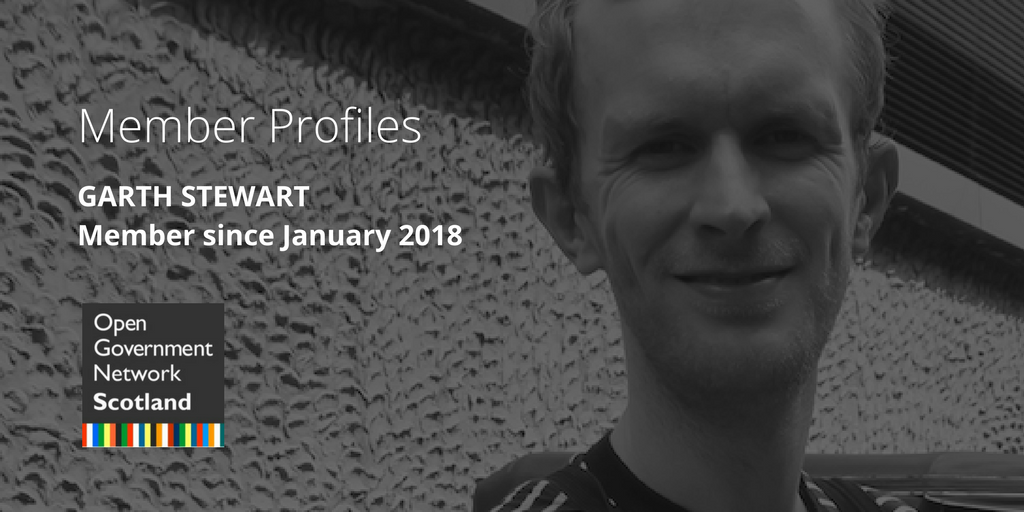Know your network: Garth Stewart
Job title: Web Archivist
Organisation: National Records of Scotland
Location: Edinburgh
Member since: January 2018
Contact me at: [email protected], @garthstewart1 on Twitter
How would you describe your job to a child?
I help select and collect the archival public record of Scotland.
The archival public record are those documents which have been produced by successive governments in Scotland, and selected for permanent preservation as historical evidence of their business and function at that time.
The public record used to be made of paper: think bound ledgers, written letters, topographical drawings etc. As we use computers for nearly all our business in the 21st century, this record increasingly consists of born digital ‘stuff’: emails, relational databases, pdfs, tweets etc.
Websites are a key part of this born digital public record. It is my job to work with colleagues, website owners and stakeholders to select websites which represent what government was doing in 2018. Selected websites are then archived for permanent preservation by the NRS Web Continuity Service, and made available for public access in the NRS web archive.
As well as archiving, the Web Continuity Service also provides the opportunity for website owners to connect their live site with the web archive, to help preserve access to official online information – be this on the live web or in the web archive. This is good for user experience, good for open government.
What does the concept of open government mean to you?
In a nutshell, it means that citizens ought to be able to access open information relating to the course of government in an intuitive and meaningful way.
What would your autobiography be called?
The Archaeologist Archivist
Why did you become involved in the Open Government Network?
Working as an archivist has made me very aware of the shift in how users expect to access official information. Where once before a member of the public would have been prepared to travel to a local archive to view primary historical information, that same user – naturally influenced by the power and convenience of tools like Google – increasingly expect to access ‘everything’ from the comfort of their own arm chair.
This can create quite big headaches for governments and its own accountability – particularly when handling historical information which is anything but “Google-friendly”.
It is this potential imbalance – and the work required to address this – which really interests me. There are potential tools and messages becoming available that may be able to help fix this – like web archiving – and I hope the Open Government Network provides opportunities for widening this discussion.
Tell us one thing you’d like this Network to do in the next 6 months
Hold a few more stakeholder sessions – it would good to have a chance to meet other folk involved in this discussion
Consider making historical information – with all its aspects and complexities – a subject of one of these events
What does a typical day look like for you?
A typical day is often split into two key themes:
Stakeholder engagement: meeting with website owners to discuss recordkeeping, web archiving and web continuity. Talking to other archive colleagues about what an organisation’s public record looks like, and how the website relates to this. Collaborating on integrating new and changing collecting processes with archive colleagues.
Technical/’curation’ work: assist my team in the quality assurance of captured content from websites. Liaison with our web archiving technical supplier (who are based in France) on capture and QA of content. Feed back to website owners after this work has concluded.
What breed of social media user are you?
A cross between a Dipper and a Denier.
What three things could members of this network get in contact with you about?
What’s an archive?
Web archiving
How website design can support open government and digital preservation
The link to the one website/blog/online community that you cannot live without, and nor should others:
https://blog.dshr.org/ – excellent insights on digital preservation and the evolving Internet
http://ws-dl.blogspot.co.uk/2015/10/2015-10-07-imls-and-nsf-fund-web.html – good blog to keep an eye on emerging user needs
https://insidegovuk.blog.gov.uk/ – for the latest on how UK Government is refining its core public website (lots of open government connotations)
#webarchiving – Twitter hashtag for all the latest from this community
Is there a particular area of open government that you’re interested in? Or, do you have a question you’d like network members to respond to?
Web development, and building the ethos of long-term access into this.
How long would you expect a typical piece of web content on an official government website to be available for?
Where do you see the open government movement in Scotland in three years?
A more confident and recognised movement, building on past action plans and helping deliver public transparency for the people of Scotland.
Biggest like:
Vinyl records/football/hiking
Biggest dislike:
Early mornings
